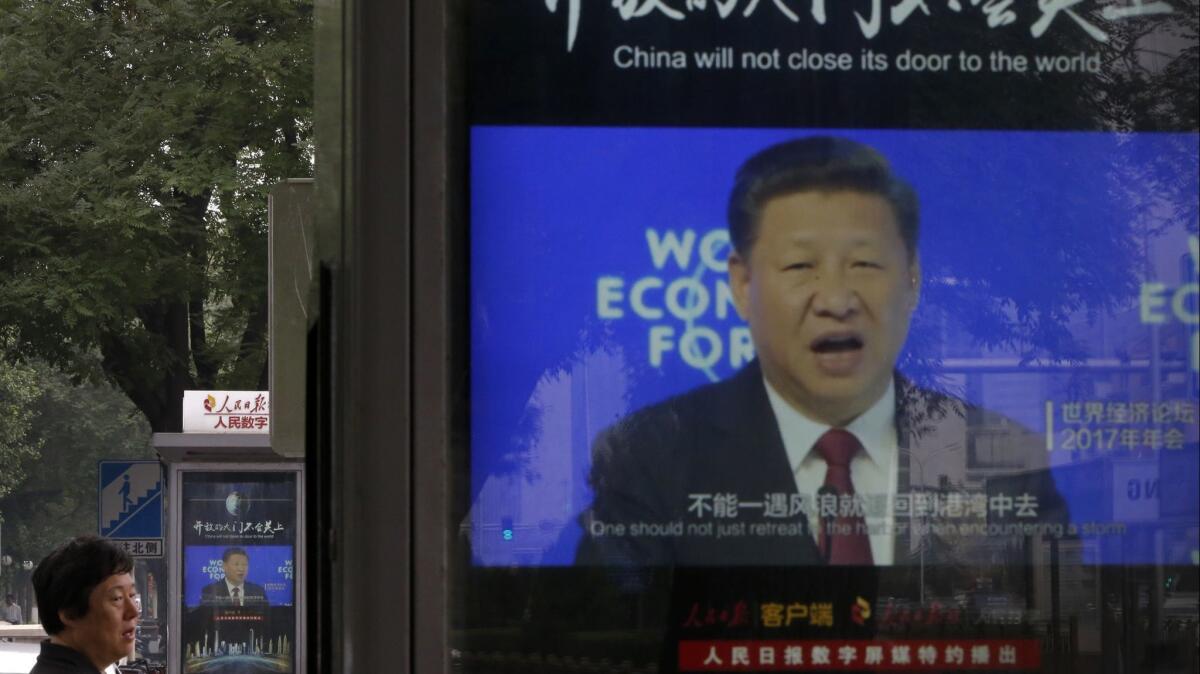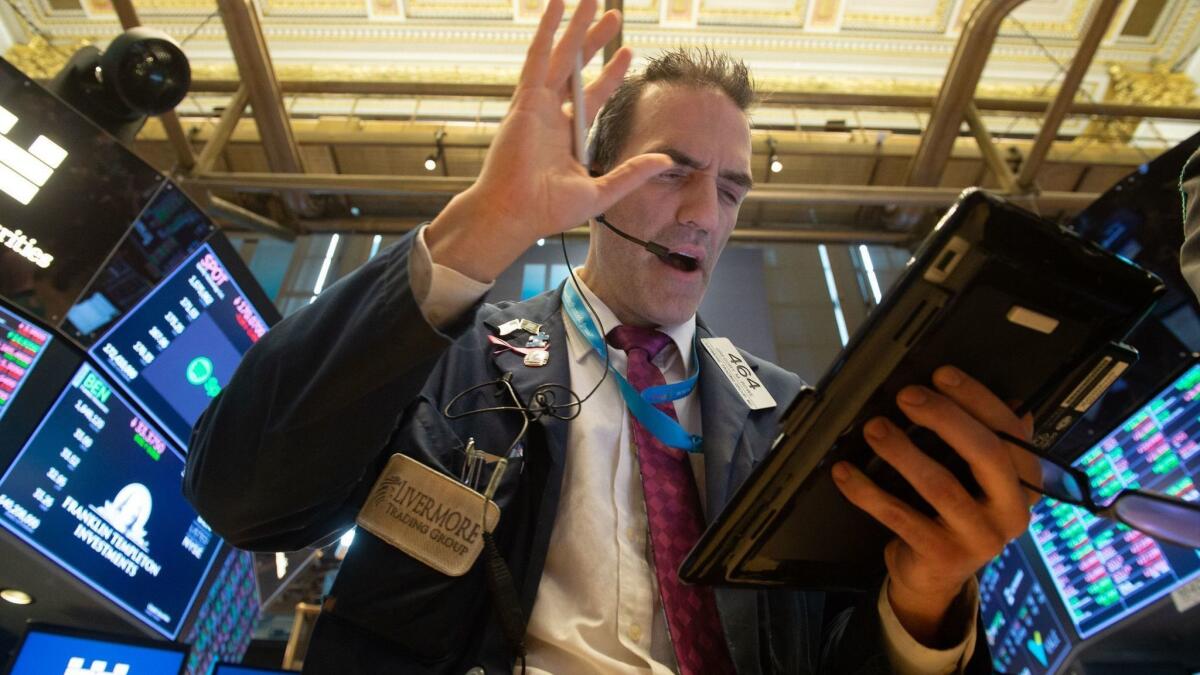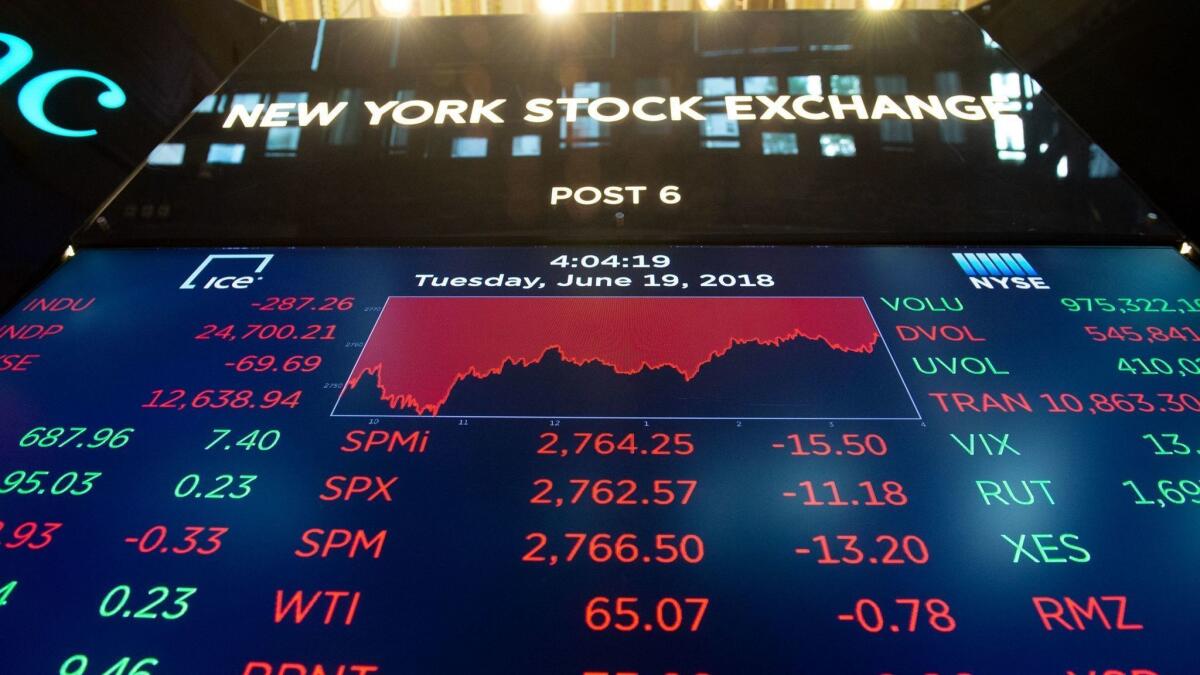Trump says trade wars are easy to win. But a trade war with China is different

- Share via
Reporting from BEIJING — If President Trump thinks trade wars are easy to win, as he once declared, he may soon discover just how different China is from your typical opponent.
China’s unchallenged one-party, one-leader government means Beijing can marshal its vast resources quickly and almost at will, as it did Sunday when the People’s Bank essentially freed up tens of billions of dollars in credit to help smaller businesses and support growth.
It was no coincidence that the change, following a directive from the central government, was set to begin July 5 — a day before Trump’s first big blast of tariffs on Chinese imports takes effect.
America’s central bank, the Federal Reserve, prides itself on independence and would chafe if the White House directed it to make money flow more easily. Not so in China.
“Obviously the timing is related to the trade war,” said Andrew Polk, a founding partner at Trivium China, a Beijing-based research firm, referring to the move to protect China’s small business and investors from Trump’s tariffs — simply by adjusting the banks’ reserve requirements.
Although some sort of credit easing was expected for broader structural reasons, Polk said Chinese policymakers clearly “can act in concert in a way that the U.S. just can’t.”
Beijing’s unrivaled authority allows it not only to blunt the domestic impact of American moves, but also to hit back with commercial weapons at government disposal. Already China has held up regulatory approvals such as Qualcomm’s merger bid and has subjected American fruits and other imports to extra scrutiny.
What’s more, the Chinese government can easily launch a propaganda campaign that would quickly lead to a boycott of American goods such as Apple’s -iPhones, which has a $40-billion market in China, wrote Nicholas Lardy, a China expert at the Peterson Institute for International Economics. “Similarly, General Motors sells more cars in China than in the United States, sales that could easily be disrupted by the Chinese government,” he said.

Chen Bo, economics professor at Huazhong University of Science and Technology in Wuhan, readily acknowledges that Beijing doesn’t have the same constraints as Washington.
“We are sort of an authoritarian kind of government,” he said. Chinese businesses harmed by U.S. tariffs may not be happy, he said, but their voices won’t be heard publicly. State-controlled media will see to that. “Our government can tolerate loss to businesses without jeopardizing its governance in the future,” said Chen.
Of course, there are limits to such losses even for Beijing, and in the eyes of some experts, China is fearful of an all-out trade war. By the numbers, the Trump administration seems to have an edge in a tit-for-tat trade fight, which is widely expected to escalate dramatically on July 6.
That’s when the U.S. will start assessing 25% tariffs on $34 billion worth of Chinese machinery, medical instruments, aircraft parts and other goods — to punish China for years of intellectual property theft. Beijing has vowed to retaliate by targeting mostly U.S. farm products and seafood, also valued at $34 billion, to be taxed at the same rate on the same day as the American tariffs.
But Trump has threatened 10% tariffs on an additional $400 billion of Chinese imports — something that Beijing cannot match as China’s total exports to the United States last year were only about $130 billion.
And by that rationale, Peter Navarro, a top trade advisor to Trump and a vocal hard-liner, argued last week that China has “much more to lose than we do.”
That may be true in terms of the large U.S. market, but China’s sales to other countries amount to more than $1.8 trillion. And, since Trump has attacked traditional American trade partners in Europe, Mexico and parts of Asia, Beijing may have new opportunities to grow its non-U.S. sales.
Trump has acknowledged there could be short-term pain for American exporters and has talked about supporting farmers caught in the trade conflict. The president also may be counting on the strong economy to absorb the blow. The GOP’s massive tax cuts have given a boost to America’s economy — and domestic demand.

China’s economic growth by comparison has been slowing as Beijing has moved to curb the economy’s reliance on debt. So U.S. tariffs will be coming at a time when the domestic economy is vulnerable. While China today depends far less on exports than before, they still accounted for almost 20% of its economy in 2016. Exports made up about 12% of the American economy.
“It’s a major concern to China, so China wants to avoid” a trade war, said Wang Yong, a professor at Peking University’s School of International Studies. Of particular worry, he said, is the long-term loss of business to competitors in Southeast Asia and other parts of the world.
At the same time, he and other Chinese say that backing down in the face of Trump’s threats is not an option.
Some see the confrontation in the context of President Xi Jinping’s highly promoted “China dream” of restoring the country’s leading role in the region and world, never again to suffer a century-long subjugation by foreign powers.
“If we don’t fight back, what will the citizens think of the Chinese government?” said Mei Xinyu, a researcher at a think tank affiliated with China’s Commerce Ministry. “By starting the trade war, you don’t respect the Chinese government and its dignity.”
But like any war, what may count in the end are not the sheer number of troops, but the resolve and resourcefulness of the parties. And here, Chinese and Western analysts alike think the Trump administration may be underestimating what it’s up against.
In China, the looming trade war is widely seen as having been launched by Trump, contrary to the president’s oft-stated comment that China started it long ago — and was winning because of its large trade surplus with the United States.
Like many in the United States, Chinese officials have struggled to understand the White House’s shifting positions on trade. Some say they were shocked after Trump announced last month that he would proceed with the tariffs — only days after Treasury Secretary Steven T. Mnuchin declared that the trade war was on hold.
And since then, the Chinese rhetoric also has sharpened: The Foreign Ministry called Trump’s threat of $400 billion in tariffs “blackmail” and state-run media described the pressure as U.S. “trade terrorism.”
Whether most Chinese prefer that Beijing hit back hard, as Mei advocates, analysts say China may be preparing to ride out a protracted fight.
“They can eat more bitterness than Americans,” said Polk, using an expression capturing the many hardships endured by people in China. The “Chinese propaganda machine is already whipping this up as a nationalist thing. They’re prepared to lose some jobs and cloak it under nationalism.”
In the long run, stirring up nationalism could be a double-edged sword for the Chinese, as such heated emotions could be hard to control and even risk people turning against Beijing.
But whatever the long-term impact in China, increased anti-American sentiments there could produce lasting damage to U.S. business interests. Down the road, U.S. companies in China stand to lose much more than Chinese counterparts in America.
In 2015, U.S. goods and services produced and sold in China totaled $223 billion, compared with a minuscule $10 billion of Chinese products made and sold in the United States, Peterson’s Lardy wrote last week.
In a ground war involving trade and commerce, China can make life far more difficult for U.S. enterprises than vice versa. And to show that it can and will do so, China already has started to bare its teeth, with toughened customs enforcement and even stricter enforcement of advertising laws, said Jake Parker, vice president at the U.S.-China Business Council in Beijing.
“There’s no punishment to U.S. firms,” said Chen. “There’s no such policy — yet.”
Twitter: @dleelatimes
More to Read
Sign up for Essential California
The most important California stories and recommendations in your inbox every morning.
You may occasionally receive promotional content from the Los Angeles Times.











